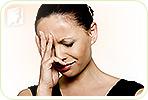By definition, chronic daily headaches must occur 15 days or more per month for at least three months. Chronic daily headaches are classified by how long they last - more or less than four hours. Chronic daily headaches are the described as the persistent, everyday headaches that typically last a few hours. The leading cause of headaches in menopausal women is hormone imbalance, since estrogen causes blood vessels to expand, and progesterone makes them constrict. In fact, women are five times more likely to get migraines than men because of this.
Managing Chronic Headaches
Follow these tips in order to overcome daily headaches:
Drink water
Dehydration is a primary cause of chronic headaches, so it is important to drink plenty of water throughout the day. Staying properly hydrated can help boost energy levels, and also reduce the frequency and intensity of headaches. A tell-tale way to see if you are hydrated is by the color of your urine - it should be a pale yellow; anything darker than that indicates dehydration.
On the other hand, it is important to avoid extremes, as they could lead to overhydration. This can typically be recognized by overly clear, abundant urination; excessive water intake could cause mild dizziness, general weakness, and sometimes mild headaches.
Sleep
Many Americans do not get adequate amounts of sleep each night because of stress, poor diet, or lack of exercise. Insufficient sleep can lead to chronic headaches. The average adult needs between seven and eight hours of sleep each night. Helpful ways to unwind and get a good night's rest are soaking in a warm bath, reading, or meditating. Trying these methods before bed may help relax and clear a restless mind. It is important to remember that oversleeping is counter-productive, as it can cause drowsiness and headaches.
Exercise regularly
Public health experts recommend adults engage in at least 30 minutes of aerobic activity, three times per week. Walking, swimming, cycling, and yoga are all excellent low-impact workouts. Studies have shown that exercise can significantly increase energy levels, relieve stress, and improve the efficiency of the heart, lungs, and muscles. Additionally, regular exercise helps you get better sleep and releases endorphins in the brain, which improves mood.
Eat healthy
Eating small, healthy meals and snacks every three to four hours is recommended for peak performance and energy. Since low blood sugar is a contributor to chronic headaches, it is important to eat healthy and often in order to prevent them. Studies have shown that eating smaller, more frequent meals and snacks is more beneficial than three large meals a day. An ideal healthy meal includes plenty of protein, fiber, and whole grains. Foods high in sodium and saturated fats should be avoided in order to prevent headaches.
Over-the-counter medication
If all else fails, try over the counter medicine like aspirin, ibuprofen, or acetaminophen. These medications help stop the headache in progress, and are also referred to as “acute treatment”. If these over the counter medications are not strong enough, talk to your doctor about prescription pain medication and the cause of your headaches.
Chronic daily headaches must occur 15 days or more per month for at least three months, and each headache can last up to four hours. Chronic daily headaches can range from mild to severe and interfere with the ability to carry out normal activities. Hormone fluctuations are the foremost cause of chronic headaches in women, but other lifestyle factors like lack of exercise and poor diet can also trigger them. Getting plenty of exercise, staying hydrated, and getting sufficient amounts of sleep can help manage chronic daily headaches.
Click on the following link to learn more about the three approaches on how to handle chronic headaches.
Sources
- National Health Service UK. (2013). Hormone headaches. Retrieved August 27, 2014, from http://www.nhs.uk/livewell/headaches/pages/hormonalheadaches.aspx
- National Institute of Neurological Disorders and Stroke. (2015). NINDS Headache Information Page. Retrieved August 27, 2014, from http://www.ninds.nih.gov/disorders/headache/headache.htm




